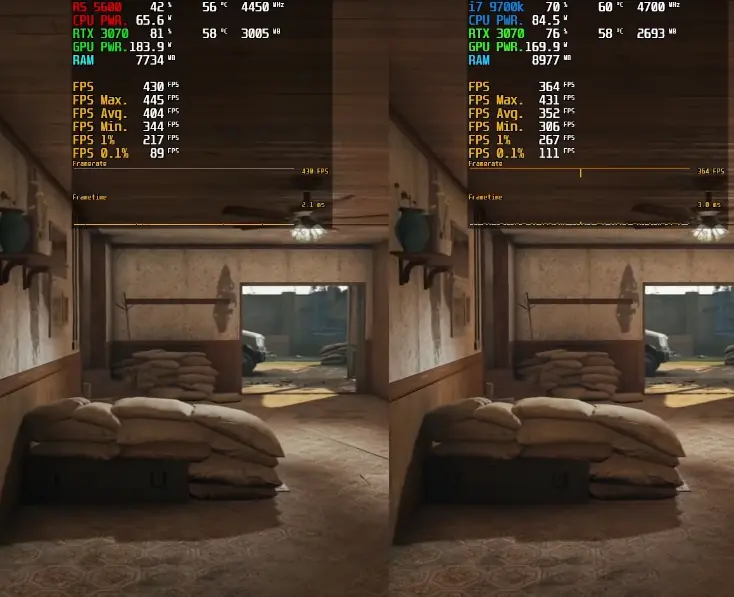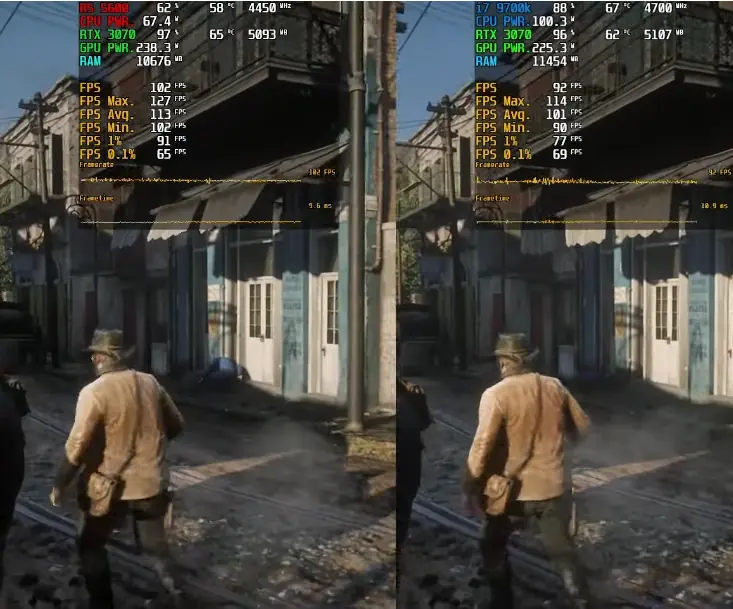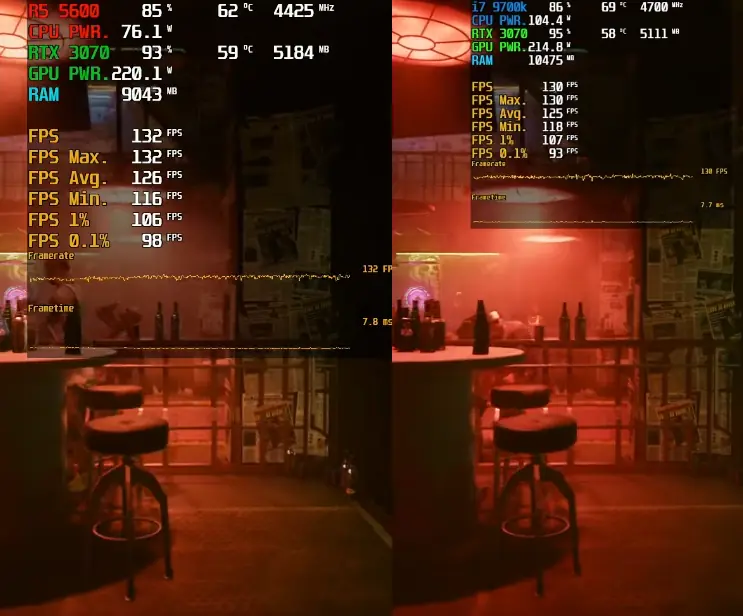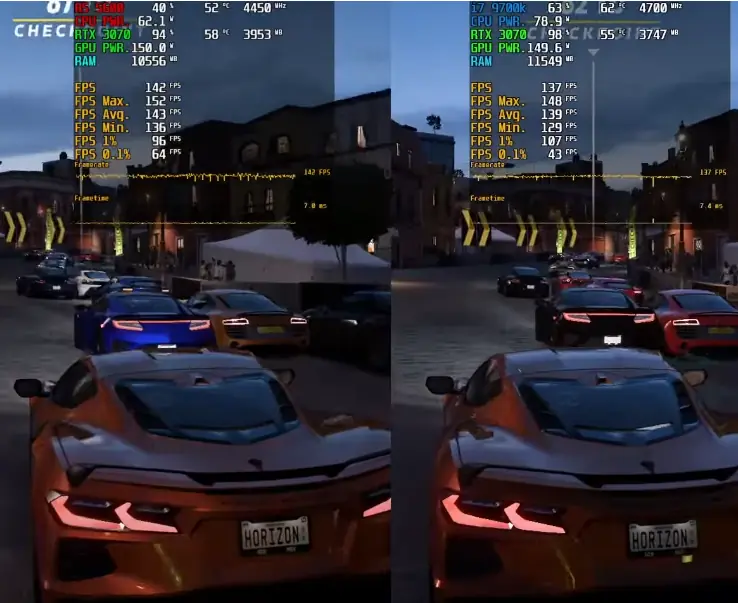Today will share the latest game performance test of Core i7-9700K, and arrange a competitive Ryzen 5 5600 as a reference for comparison to assess the current actual performance of Core i7-9700K. Is it still enough? Is it necessary to upgrade? This article will reveal the answers.
01
Parameter Comparison of Ryzen 5 5600 and i7 9700K
Core i7-9700K was released on October 19, 2018, using a 14-nanometer process, featuring 8 cores and 8 threads, with a base operating frequency of 3.6GHz, a maximum operating frequency of 4.9GHz, equipped with 12MB of smart cache, power consumption of 95W, and a suggested retail price of $385.
Ryzen 5 5600 was released on April 4, 2022, using TSMC’s 5-nanometer process, featuring 6 cores and 12 threads, with a Level 1 cache of 384 KB, Level 2 cache of 3MB, Level 3 cache of 32 MB, a base operating frequency of 3.5GHz, a maximum operating frequency of 4.4 GHz, a power consumption of 65W, and a suggested retail price of $199.
02
Benchmark Performance Comparison of Ryzen 5 5600 and i7 9700K

On the Cinebench R23 platform, the Core i7-9700K’s single-core performance score is 1336 points, and its multi-core performance score is 10326 points. The Ryzen 5 5600, on the other hand, has a single-core performance score of 1504 points and a multi-core performance score of 11077 points.
Based on these scores, the Core i7-9700K’s single-core and multi-core performance is 12.6% and 7.3% lower than the Ryzen 5 5600, respectively. Objectively, there is a noticeable difference, though not significant.
03
Test Platform Configuration
The main configurations are as follows:
- Ryzen 5 5600 paired with the ASUS X570-E motherboard.
- Core i7-9700K paired with the ASUS Z390-E Strix motherboard.
All other components are identical, with 16GB DDR4 3200MHz RAM, a GeForce RTX 3070 graphics card, and the Windows 10 Pro operating system.
04
Game Benchmark Testing of Ryzen 5 5600 and i7 9700K
The following six games will be tested separately, all using 1080P high-quality settings. In the series of images below, the left side represents the Ryzen 5 5600 platform, while the right side represents the Core i7-9700K platform.
① The first game is “Rainbow Six Siege”

On the Ryzen 5 5600 platform
- Average Frame Rate: 404 FPS
- Minimum Instantaneous Frame Rate: 217 FPS
- Frame Time: 2.1ms
- CPU usage: 42%
- CPU Power Consumption: 65.6W
- CPU Temperature: 56 degrees
- Memory usage: 7.7GB
- GPU usage: 81%
- Video Memory usage: 3.0GB
- GPU power consumption: 184W
- GPU Temperature: 58 degrees
On the Core i7-9700K platform
- Average Frame Rate: 352 FPS
- Minimum Instantaneous Frame Rate: 267 FPS
- Frame Time: 3.0ms
- CPU usage: 70%
- CPU Power Consumption: 84.5W
- CPU Temperature: 60 degrees
- Memory usage: 9.0GB
- GPU usage: 76%
- Video Memory usage: 2.7GB
- GPU power consumption: 170W
- GPU Temperature: 58 degrees
In this game, the Core i7-9700K platform has a 28% higher CPU usage, 1.3GB higher memory usage, 5% lower GPU usage, and 0.3GB lower VRAM usage compared to the Ryzen 5 5600 platform.
In terms of average FPS, the Core i7-9700K platform is 52 FPS lower than the Ryzen 5 5600 platform, but it has a 50 FPS higher minimum instantaneous FPS, 1ms higher frame time, 20W higher power consumption, and 4 degrees higher temperature.
② The second game is “Call of Duty: Warzone 2.0”

On the Ryzen 5 5600 platform
- Average Frame Rate: 116 FPS
- Minimum Instantaneous Frame Rate: 64 FPS
- Frame Time: 8.8ms
- CPU usage: 59%
- CPU Power Consumption: 70.3W
- CPU Temperature: 59 degrees
- Memory usage: 12.4GB
- GPU usage: 84%
- Video Memory usage: 7.0GB
- GPU power consumption: 181W
- GPU Temperature: 60 degrees
On the Core i7-9700K platform
- Average Frame Rate: 126 FPS
- Minimum Instantaneous Frame Rate: 93 FPS
- Frame Time: 7.8ms
- CPU usage: 63%
- CPU Power Consumption: 85.1W
- CPU Temperature: 70 degrees
- Memory usage: 13.8GB
- GPU usage: 97%
- Video Memory usage: 7.1GB
- GPU power consumption: 200W
- GPU Temperature: 59 degrees
In this game, the Core i7-9700K platform has a 4% higher CPU usage, 1.4GB higher memory usage, 13% higher GPU usage, and nearly equal VRAM usage compared to the Ryzen 5 5600 platform.
In terms of average FPS, the Core i7-9700K platform is 10 FPS higher than the Ryzen 5 5600 platform, with a 29 FPS higher minimum instantaneous FPS and a 1ms lower frame time. Overall, the gaming performance is better, but it comes with a higher power consumption of 15W and a higher temperature of 11 degrees.
③ The third game is “Red Dead Redemption 2”

On the Ryzen 5 5600 platform
- Average Frame Rate: 113 FPS
- Minimum Instantaneous Frame Rate: 91 FPS
- Frame Time: 9.6ms
- CPU usage: 62%
- CPU Power Consumption: 67.4W
- CPU Temperature: 58 degrees
- Memory usage: 10.7GB
- GPU usage: 97%
- Video Memory usage: 5.1GB
- GPU power consumption: 238W
- GPU Temperature: 65 degrees
On the Core i7-9700K platform
- Average Frame Rate: 101 FPS
- Minimum Instantaneous Frame Rate: 77 FPS
- Frame Time: 10.9ms
- CPU usage: 88%
- CPU Power Consumption: 100.3W
- CPU Temperature: 67 degrees
- Memory usage: 11.5GB
- GPU usage: 96%
- Video Memory usage: 5.1GB
- GPU power consumption: 225W
- GPU Temperature: 62 degrees
In this game, the Core i7-9700K platform has a 26% higher CPU usage, 0.8GB higher memory usage, and nearly equal GPU usage and VRAM usage, indicating that neither has a significant advantage in utilizing graphics card performance.
In terms of average FPS, the Core i7-9700K platform is 12 FPS lower than the Ryzen 5 5600 platform, with a 14 FPS lower minimum instantaneous FPS and a 1.3ms higher frame time. Additionally, it has a higher power consumption of 33W and a higher temperature of 9 degrees.
④ The fourth game is “Cyberpunk 2077”

On the Ryzen 5 5600 platform
- Average Frame Rate: 126 FPS
- Minimum Instantaneous Frame Rate: 106 FPS
- Frame Time: 7.8ms
- CPU usage: 85%
- CPU Power Consumption: 76.1W
- CPU Temperature: 62 degrees
- Memory usage: 9.0GB
- GPU usage: 93%
- Video Memory usage: 5.2GB
- GPU power consumption: 220W
- GPU Temperature: 59 degrees
On the Core i7-9700K platform
- Average Frame Rate: 125 FPS
- Minimum Instantaneous Frame Rate: 107 FPS
- Frame Time: 7.7ms
- CPU usage: 86%
- CPU Power Consumption: 104.4W
- CPU Temperature: 69 degrees
- Memory usage: 10.5GB
- GPU usage: 95%
- Video Memory usage: 5.1GB
- GPU power consumption: 215W
- GPU Temperature: 58 degrees
On the Core i7-9700K platform, the average FPS is 125, with a minimum instantaneous FPS of 107. The frame time is 7.7ms, CPU usage is 86%, power consumption is 104.4W, temperature is 69 degrees, memory usage is 10.5GB, GPU usage is 95%, VRAM usage is 5.1GB, GPU power consumption is 215W, and GPU temperature is 58 degrees.
In this game, the CPU usage on both platforms is essentially equal. The Core i7-9700K platform has 1.5GB higher memory usage and 2% higher GPU usage, with nearly equal VRAM usage.
In terms of average FPS, minimum instantaneous FPS, and frame time, both platforms have similar performance, but this is achieved on the Core i7-9700K platform at the cost of using more memory and 2% more GPU performance.
Additionally, in terms of power consumption, the Core i7-9700K is 28W higher, and the temperature is 7 degrees higher compared to the Ryzen 5 5600 platform.
⑤ The fifth game is “GTA V”

On the Ryzen 5 5600 platform
- Average Frame Rate: 177 FPS
- Minimum Instantaneous Frame Rate: 121 FPS
- Frame Time: 4.6ms
- CPU usage: 30%
- CPU Power Consumption: 57.9W
- CPU Temperature: 52 degrees
- Memory usage: 7.5GB
- GPU usage: 43%
- Video Memory usage: 3.8GB
- GPU power consumption: 124W
- GPU Temperature: 52 degrees
On the Core i7-9700K platform
- Average Frame Rate: 169 FPS
- Minimum Instantaneous Frame Rate: 7 FPS
- Frame Time: 4.9ms
- CPU usage: 56%
- CPU Power Consumption: 68.8W
- CPU Temperature: 58 degrees
- Memory usage: 10.3GB
- GPU usage: 47%
- Video Memory usage: 4.1GB
- GPU power consumption: 117W
- GPU Temperature: 50 degrees
In this game, the Core i7-9700K platform has a 26% higher CPU usage, 2.8GB higher memory usage, 4% higher GPU usage, and 0.3GB higher VRAM usage compared to the Ryzen 5 5600 platform.
In terms of average FPS, the Core i7-9700K platform is 8 FPS lower than the Ryzen 5 5600 platform, which is negligible. However, there is a significant difference in the minimum instantaneous FPS, indicating lower stability. The frame time is nearly equal, but the Core i7-9700K platform has a higher power consumption of 11W and a higher temperature of 6 degrees.
⑥ The sixth game is “Forza Horizon 5”

On the Ryzen 5 5600 platform
- Average Frame Rate: 143 FPS
- Minimum Instantaneous Frame Rate: 96 FPS
- Frame Time: 7.0ms
- CPU usage: 40%
- CPU Power Consumption: 62.1W
- CPU Temperature: 52 degrees
- Memory usage: 10.6GB
- GPU usage: 94%
- Video Memory usage: 4.0GB
- GPU power consumption: 150W
- GPU Temperature: 58 degrees
On the Core i7-9700K platform
- Average Frame Rate: 139 FPS
- Minimum Instantaneous Frame Rate: 107 FPS
- Frame Time: 7.4ms
- CPU usage: 63%
- CPU Power Consumption: 78.9W
- CPU Temperature: 62 degrees
- Memory usage: 11.5GB
- GPU usage: 98%
- Video Memory usage: 3.7GB
- GPU power consumption: 150W
- GPU Temperature: 55 degrees
In this game, the Core i7-9700K platform has a 23% higher CPU usage, 0.9GB higher memory usage, 4% higher GPU usage, and 0.3GB lower VRAM usage compared to the Ryzen 5 5600 platform.
In terms of average FPS, the Core i7-9700K platform is 4 FPS lower than the Ryzen 5 5600 platform, which is negligible. However, the minimum instantaneous FPS is 11 FPS higher, indicating a slight advantage in stability. The frame time is nearly equal, but the Core i7-9700K platform has a higher power consumption of 17W and a higher temperature of 10 degrees.
05
Comparative Conclusions of Ryzen 5 5600 and i7 9700K
In the testing of the six games mentioned, there is minimal difference in average FPS between the Core i7-9700K and Ryzen 5 5600 platforms in three games, essentially on par. Apart from a significant difference in average FPS in the first game, the maximum gap in the other two games is below 20 FPS.
So, if we purely compare the overall gaming performance of the two platforms, the conclusion is that there is a noticeable difference, but not a substantial one, within an acceptable range. In other words, if you are currently using the Core i7-9700K and your requirements are not particularly high, there is no immediate need to upgrade.
Compared to the gaming performance evaluation of the Core i5-9400F just a month ago, the overall CPU usage of the Core i7-9700K is not significantly stronger. However, considering its paired GPU, the GeForce RTX 3070, which performs around twice as well as the GeForce GTX 1080, the results are acceptable.
Nevertheless, the performance gap between the Core i7-9700K and Ryzen 5 5600 is quite evident. Although the final gaming performance can almost catch up with the Ryzen 5 5600, its CPU usage is significantly higher, consuming more memory resources, and exhibiting higher power consumption and temperature. The overall weaknesses and disadvantages are apparent.




